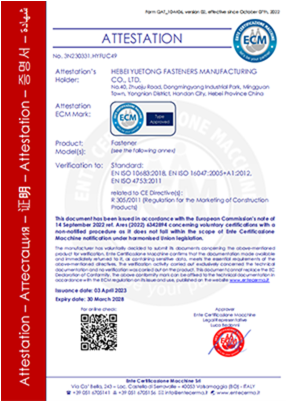Oct . 10, 2024 12:35 Back to list
M18 Fine Thread Nuts for Secure and Reliable Fastening Solutions
Understanding M18 Fine Thread Nuts An Essential Component in Engineering
In the vast world of engineering and construction, the importance of reliable fastening components cannot be overstated. One such vital component is the M18 fine thread nut. Understanding this type of nut is essential for engineers and designers looking to ensure the integrity and reliability of their projects.
What is an M18 Fine Thread Nut?
The designation “M18” refers to a metric thread size, indicating that the nut has a nominal diameter of 18 millimeters. The term “fine thread” signifies that the nut features a closer thread pitch compared to standard or coarse threads. Specifically, M18 fine thread nuts typically have a pitch of 1.5 mm. This means that the distance between the threads is smaller, allowing for more threads per unit length, which generally results in a tighter and more secure connection.
Applications and Advantages
M18 fine thread nuts are commonly used in various applications across multiple industries, including automotive, aerospace, construction, and machinery manufacturing. Their design provides several advantages over coarse thread nuts
2. Greater Precision Fine threads allow for more precise adjustments, making them ideal for applications that require exact positioning or fine-tuning.
m18 fine thread nut

3. Resistance to Vibration Because of their tighter fit, fine thread nuts are typically more resistant to loosening under vibrational forces, which is especially important in high-performance applications.
4. Versatility These nuts can be used with several different materials and in various environmental conditions, providing versatility in design.
Material and Coating Options
M18 fine thread nuts can be made from a variety of materials, including carbon steel, stainless steel, and alloys. The choice of material can affect the strength, corrosion resistance, and overall performance of the nut. Additionally, many nuts are coated or treated to enhance their durability. Common coatings include zinc plating, which offers corrosion resistance, and hot-dip galvanizing for increased longevity in harsh environments.
Installation and Torque Specifications
Proper installation of M18 fine thread nuts is crucial to achieving their full potential. The torque specifications should be followed carefully, as overtightening can lead to thread stripping or damage, while insufficient tightening may result in a loose fit. It is often recommended to use a torque wrench for precision.
Conclusion
In conclusion, M18 fine thread nuts serve as an essential component in many engineering applications. Their unique design provides distinct advantages, such as enhanced strength, precision, and resistance to loosening. Understanding these nuts, their materials, applications, and proper installation techniques is vital for engineers and technicians alike. In an industry where reliability and performance are paramount, M18 fine thread nuts stand out as a trusted choice for secure fastening. Whether in the development of sophisticated machinery or the construction of robust structures, the significance of these seemingly simple components cannot be overlooked.
-
The Ubiquitous Reach of DIN934 in Application Realms
NewsMay.16,2025
-
Exploring Different Bolt Types
NewsMay.16,2025
-
Cracking the Code of Sleeve Anchor Mastery
NewsMay.16,2025
-
Clamp Design Principles,Types and Innovations
NewsMay.16,2025
-
Artistry Inspired by the Humble Anchor Bolt
NewsMay.16,2025
-
A Deep Dive into Screw Types
NewsMay.16,2025


